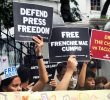by Bishop Felixberto Calang
Main Convenor, Sowing the Seeds of Peace
During the Marcos Dictatorship, the word “salvage” or “salbids” translated into “extrajudicial killing.”
To “salbids” is to summarily execute either a drug addict, a suspected criminal, or a communist.
It is unfortunate that to call for the salvaging of the the GRP-NDFP peace talks amid its virtual collapse can also mean its summary execution.
We at Sowing the Seeds of Peace express that it is only the GRP that can now “salvage” the peace talks. That means the decision whether to finally save it or to finally kill it lies in the hands of the GRP.
The GRP should not “undo” more than 20 years of the peace process with the NDFP. For the GRP to cancel the peace talks to allow a 3-month review by the AFP in order to ultimately justify the GRP’s withdrawal from the 1992 Joint Hague Declaration is truly living up to the word “salbids.” Doing so means the GRP is not only “unbinding” itself from these agreements but from its commitment to a just and lasting peace.
The GRP can truly salvage the peace talks by:
• Reaffirming its commitment to the 1992 Joint Hague Declaration and all signed agreements
• For President Duterte to keep to his desire of leaving a legacy of peace by delivering on his promises made to Jose Maria Sison’s emissary Fidel Agcaoili in Davao City when he was still then President-elect
• For the Dureza and Bello-led GRP peace panel to be given the authentic delegated authority from the President to speak and uphold civilian supremacy and interests in the negotiations; their ability to negotiate should not be contravened or dictated upon by the security cluster
• Genuinely creating the conducive and enabling environment by rescinding the various Proclamations on Martial Law, Terror-tagging, etc.
The GRP can finally “salbids” the peace talks by:
• Making the security cluster as the virtual head of the GRP negotiating panel
• Demanding only the surrender and submission of the NDFP instead of seeking the middle ground in order to resolve the roots of the armed conflict
• Making the bilateral ceasefire agreement as the end-all of the negotiations instead of the signing of the CASER which is the meat of the peace process
• Resorting to an intensified all-out war which is directed against civilians especially the Lumad, Moro, and farmers of Mindanao
Ultimately, the salvaging of the peace talks rests on the President. He can either go the way of being a benevolent leader and leave a legacy of genuine peace based on social justice. Or he can force this peace upon the nation with the brutalities of all-out war.#





![[ANALYSIS] A different drug war](https://davaotoday.com/wp-content/uploads/2024/09/1000019103-110x100.png)




